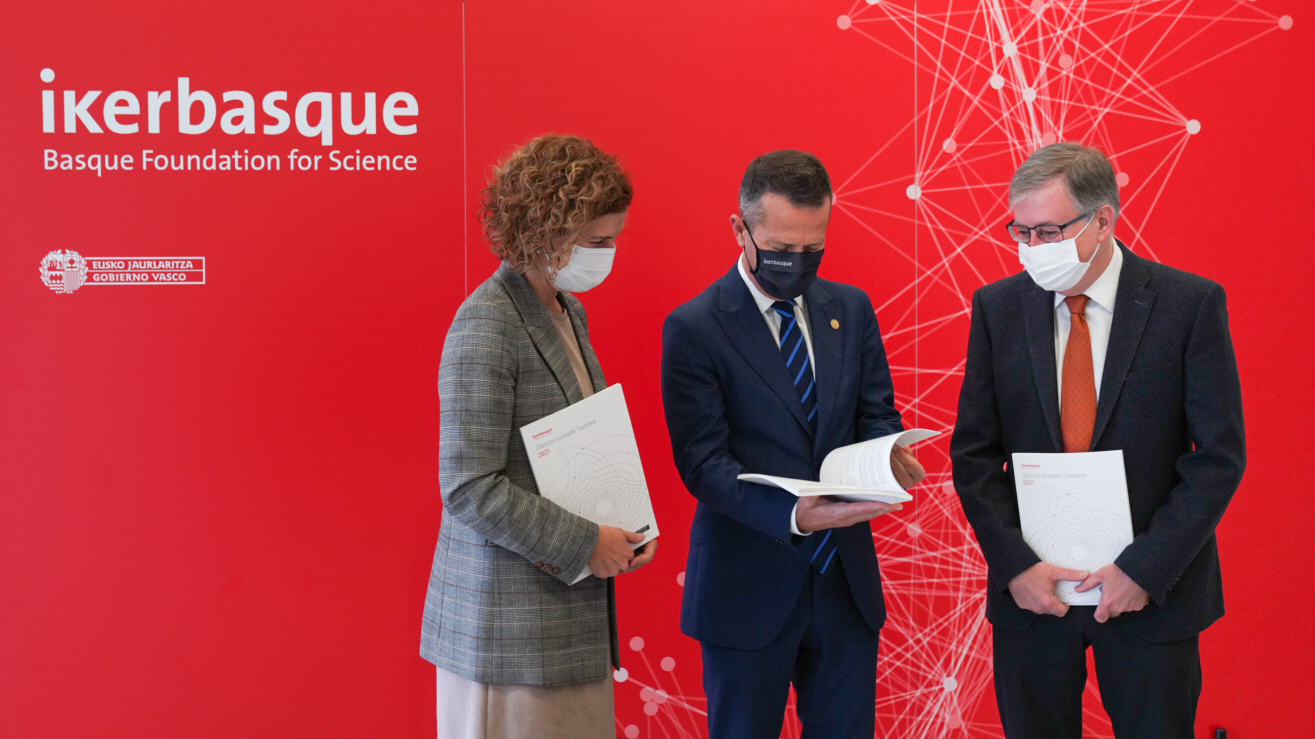
The Minister of Education Jokin Bildarratz, presented this morning together with the Director of Research, Amaia Esquisabel and the Scientific Director of Ikerbasque, Fernando Cossío, the results of the 2021 Report on Science in Euskadi. The report includes the main results of the Basque Country regarding research staff, science funding, scientific results and technology transfer through the indicators monitored by Ikerboost, the Basque Observatory of Science and Technology.
Scientific production in the Basque Country has increased by 13% in the last year, reaching 7,523 annual publications. This represents the largest increase in the last eight years. With a growth in scientific production higher than the one registered at the state level, the relative weight of the Basque Country has not ceased to increase in the last ten years and in 2020 it has reached 6.7% of the scientific production of Spain. Euskadi has doubled its scientific production in the last decade.
Likewise, the quality of research production has increased considerably and is reflected in two aspects: the percentage of scientific production published in journals of the first quartile, the most prestigious journals, has doubled in the last decade in the Basque Country. In 2020, almost 60% of scientific production has been produced in world-class journals.
On the other hand, researchers from the Basque Country collaborate when publishing their research results with the main science-producing countries worldwide: the United States, Germany, the United Kingdom, France and Italy. The internationalization of scientific production in the Basque Country has increased by almost 20 points during the last decade, going from 35% of publications with international collaboration in 2008 to 55% in 2020. In these international collaborations, Basque researchers have a relevant position, being in many cases the main authors of the publications.
According to INE data for 2019, the Basque Country is the autonomous community of Spain that invests most in R&D activities as a percentage of its GDP, close to 2%. The data on investment in R&D in the Basque Country published by Eustat indicates an increase of more than 4% compared to the previous year, reaching a historical maximum of 1,480 million euros.
Likewise, Euskadi is the leading Autonomous Community in the per capita return of the European Horizon 2020 program, with a raising of € 851M between 2014 and 2020. The Horizon 2020 Program, currently Horizon Europe, has become a key tool for the activities of EU research and innovation. Along these lines, it should be mentioned that around 5% of scientific production is cited in patents, once enough time has elapsed from the generation of new knowledge to its application.
Within this program the ERC grants from the European Research Council deserve a special mention. These are projects that provide support to researchers of any nationality and age who wish to continue their research at the frontiers of knowledge. Currently, it has become an internationally recognized indicator of excellence, due to the high number of proposals and the demanding evaluation process that follows. A total of 35 ERC projects have been developed in the Basque Country. In 2020 there are 17 ongoing projects.
Regarding production by sectors, universities participate in 65% of the global scientific production of the Basque Country - promoted by the UPV/EHU, the main Basque scientific institution, with a contribution of more than 4,000 indexed publications in 2020 -, followed by the health sector, BERC centers and technology centers. Over the last few years, new research centers have been promoted in the Basque Country (BERCs, CICs and IISs) that have a growing weight in the Basque science system. In addition, collaboration between the university sector, BERC, CIC, biosanitary and technology increases year after year.
During the last decade, the main thematic areas in which the Basque Country investigates have been maintained; Medicine is the area where it is published the most, followed by Engineering, Materials Sciences, Physics and Astronomy, and Chemistry. Furthermore, in the last 10 years, productivity in Social Sciences and Humanities has experienced remarkable growth.
Research community
In 2019 the Basque Country for the first time in its history exceeded 21,000 people who are dedicated to research work. In full-time equivalent, there would be more than 13,500 people dedicated to research, which consolidates the upward trend in the number of researchers. These figures indicate that 2% of the workforce in the Basque Country is engaged in R&D work, that is, 2 people out of every 100 employees in the Basque Country are fully or partially engaged in research.
In 2019, around 450 people defended their doctoral thesis at the three Basque universities, 17% more than the previous year. Although the number of men and women who defend doctoral theses is similar, the number of women who consolidate their research career is lower, in fact, in 2019 the percentage of women in EDP barely reached 35%.
To download the Science in the Basque Country 2021 report:
.png)
